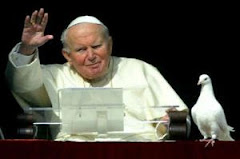Selections from John F. Kennedy's Speech to the Protestant Ministers of Houston (TX) on Religious Freedom and the Eligibility of Catholics to Serve as President

In 1960, many Americans opposed the election of a Catholic as President of the United States. Opposition was strongest from many conservative Protestant ministers. JFK took this issue head on in a speech in Houston, declaring that it was unAmerican to vote against a candidate because of his denomination.
Recently, Rick Santorum said this speech made him want to "throw up." (He said nothing about the attitude of the Protestant Ministers, a group he is now courting, who were divided between those who viewed Kennedy's speech favorably and those who thought he did not go far enough in assuring them he would respect Church-State separation.) Here are portions of the speech:
While the so-called religious issue is necessarily and properly the chief topic here tonight, I want to emphasize from the outset that we have far more critical issues to face in the 1960 election; the spread of Communist influence, until it now festers 90 miles off the coast of Florida -- the humiliating treatment of our President and Vice President by those who no longer respect our power -- the hungry children I saw in West Virginia, the old people who cannot pay their doctor bills, the families forced to give up their farms -- an America with too many slums, with too few schools, and too late to the moon and outer space.
These are the real issues which should decide this campaign. And they are not religious issues -- for war and hunger and ignorance and despair know no religious barriers.
But because I am a Catholic, and no Catholic has ever been elected President, the real issues in this campaign have been obscured -- perhaps deliberately, in some quarters less responsible than this.
… I believe in an America where the separation of church and state is absolute -- where no Catholic prelate would tell the President (should he be Catholic) how to act, and no Protestant minister would tell his parishoners for whom to vote
… while this year it may be a Catholic against whom the finger of suspicion is pointed, in other years it has been, and may someday be again, a Jew -- or a Quaker -- or a Unitarian -- or a Baptist. It was Virginia's harassment of Baptist preachers, for example, that helped lead to Jefferson's statute of religious freedom. Today I may be the victim- -but tomorrow it may be you -- until the whole fabric of our harmonious society is ripped at a time of great national peril.
I believe in an America where religious intolerance will someday end
… That is the kind of America in which I believe. And it represents the kind of Presidency in which I believe -- a great office that must neither be humbled by making it the instrument of any one religious group nor tarnished by arbitrarily withholding its occupancy from the members of any one religious group.
… I would not look with favor upon a President working to subvert the first amendment's guarantees of religious liberty. Nor would our system of checks and balances permit him to do so -- and neither do I look with favor upon those who would work to subvert Article VI of the Constitution by requiring a religious test -- even by indirection -- for it. If they disagree with that safeguard they should be out openly working to repeal it.
This is the kind of America I believe in -- and this is the kind I fought for in the South Pacific, and the kind my brother died for in Europe. No one suggested then that we may have a "divided loyalty," that we did "not believe in liberty," or that we belonged to a disloyal group that threatened the "freedoms for which our forefathers died."
And in fact this is the kind of America for which our forefathers died -- when they fled here to escape religious test oaths that denied office to members of less favored churches -- when they fought for the Constitution, the Bill of Rights, and the Virginia Statute of Religious Freedom -- and when they fought at the shrine I visited today, the Alamo. For side by side with Bowie and Crockett died McCafferty and Bailey and Carey -- but no one knows whether they were Catholic or not. For there was no religious test at the Alamo.
… instead of judging me on the basis of … pamphlets and publications we all have seen that carefully select quotations out of context from the statements of Catholic church leaders, usually in other countries, frequently in other centuries, and always omitting, of course, the statement of the American Bishops in 1948 which strongly endorsed church-state separation, and which more nearly reflects the views of almost every American Catholic.
… I do not intend to apologize for these views to my critics of either Catholic or Protestant faith -- nor do I intend to disavow either my views or my church in order to win this election.
If I should lose on the real issues, I shall return to my seat in the Senate, satisfied that I had tried my best and was fairly judged. But if this election is decided on the basis that 40 million Americans lost their chance of being President on the day they were baptized, then it is the whole nation that will be the loser, in the eyes of Catholics and non-Catholics around the world, in the eyes of history, and in the eyes of our own people.
You can watch the entire speech here: http://www.youtube.com/watch?v=mBNlS8Zg1WA















